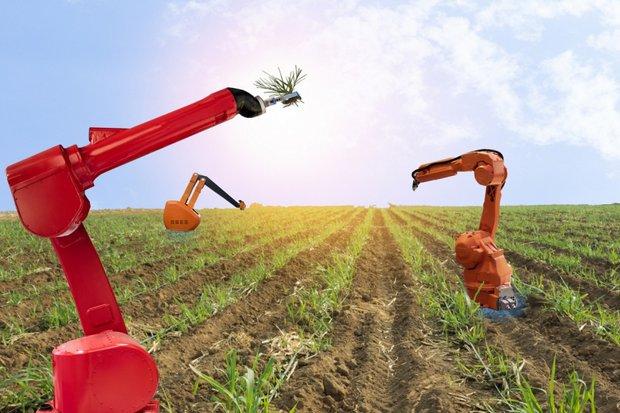The practical potential for artificial intelligence (AI) on the farm
By Victor Martino
Artificial intelligence (AI) is making its way into our daily lives and virtually every industry you can think of, from food and farming to transportation, entertainment, manufacturing and banking, to name just a few.
In a nutshell, AI is the development of computer systems that are able to perform tasks that normally require human intelligence. AI’s abilities include: visual perception, speech recognition, decision-making, prediction, and translation between languages. Powerful stuff.
AI is embedded into our smartphones, apps, vehicles and even home appliances to improve the user experience. It’s all about making things “smarter” and more capable.
In agriculture, AI offers farmers and others the ability to make better decisions, increase productivity, and see patterns that cannot be seen or figured out with human capability.
Data analytics, which among other things makes sense of patterns, along with allowing predictive ability – what a crop’s yield might be, for example – are essentially what AI is all about in agriculture.
Prem Balwani, a Florida-based expert in AI and the related field of machine learning, points out what’s also an important key benefit of AI to farmers, which is time savings. “AI can give farmers back valuable time,” he says.
Balwani, who’s worked in the field of AI and machine learning for over a decade for various companies as well as co-founding two technology start-ups – his current start-up is iGrabit, which is an e-commerce grocery platform that uses AI to make all aspects of the food supply chain and food retailing more information-efficient – says AI’s ability to free up a farmer’s time is valuable because he or she can focus on more important tasks, such as strategic planning, finding new and better markets for the crops they grow, and a myriad of other high-value tasks, all of which can result in a more efficient and profitable operation.
Claudia Roessler, director of agriculture industry solutions for software giant Microsoft, says Microsoft noticed that agriculture companies were trying to make sense of things like AI, big data, machine learning and predictive analytics in order to improve the ways things are done on the farm. Most companies weren’t equipped to deal with these new technologies however, she says, so Microsoft decided to get involved, acting as a navigator for agriculture and farmers.
Microsoft has created a program called “AI for Earth,” which is working with universities and non-profit organizations throughout the world to advance AI in agriculture. The goal of this research is for it to be applied on the farm by ag extension agents and others that work directly with farmers.
On a more direct level Microsoft offers farmers a number of commercial software products along with training. These products are bringing AI directly to farmers and to the farm.
Presently there’s a strong momentum in focusing AI on automation and robotics in farming — autonomous tractors, smart weeding machines and precision spraying, for example.
But AI also can answer important questions involving plant genomics, the impact of weather and soil on plant growth and plant health, and other similar weighty issues that can assist farmers in increasing crop yield and thus profitability.
Being smarter and more capable are in many ways the two hallmarks of farmers, who strive to achieve both every day on the farm.
Farming is a tough and time-consuming business, which is where AI comes in.
Take self-driving “smart” tractors for instance. They can save farmers enormous costs in labor and time over the long run. They are still in their infancy on the farm but expect to see more and more of these tractors without drivers roaming California farmlands because major ag equipment players like John Deere and others are fully-committed to making them a staple on the farm in the coming years.
When I look at the best case scenario of AI on the farm, what I see is the ability for farmers to be significantly more efficient, and as a result having a more efficient operation.
These are five AI-enabled technologies I think have real promise and efficacy on the farm today and tomorrow. Farmers should become familiar with each one if they aren’t already.
Drones
Drones, or unmanned aerial vehicles, can help farmers by identifying pest and weed damage, crops in need of irrigation, and many other important conditions that make farming difficult and time-consuming. With all the data gathered by drones, farmers can decrease risk and waste, which is important to the bottom line.
Pest and weed control
AI-enabled “smart” weeding machines and precision spraying devices are allowing farmers to decrease pesticide and fungicide use, plus save on labor costs. Machine learning, which uses statistical techniques to give computer systems the ability to “learn” with data without being explicitly programmed, is key to this technology. The technology is moving and improving rapidly.
Magic algorithms
Using AI and machine learning, various companies have developed agricultural yield boosting algorithms that can show farmers what’s going to be best for a crop. Some farmers are making significant headway in maximizing crop yields by applying the algorithms in computer models developed for them. This is in its infancy. But expect great strides in the next year or two.
Robotic harvesting equipment
We’re in the first quarter of a four quarter game with AI-enabled robotic harvesting equipment. But the second quarter could come tomorrow because of how rapidly advances are being made in the technology. These systems are crop-dependent – they’re being used in berry and lettuce harvesting now in California, for example. Expect expansion to other crops though. The shortage of farm labor in California is a major driver in this space.
Voice for farmers
Hello “Alexa,” this is farmer Joe. AI-powered “smart” voice technology devices like Amazon’s “Alexa” and specialized chat bots for farmers are brand new but hold much promise. Imagine farmers being able to have one of these AI bots help them to make decisions on a range of difficult issues on the farm. The farmer’s friend for problem solving. The challenge is packing these devices with the right information and capabilities. We’re not there quite yet — but it’s coming.
Farming is becoming increasingly more challenging. The purpose of technology is to reduce the risk and challenge.
Artificial intelligence is already doing that. Its promise on the farm is huge. Its purpose is to help farmers to be “smarter” and more capable, along with giving them back some time.
By Victor Martino









